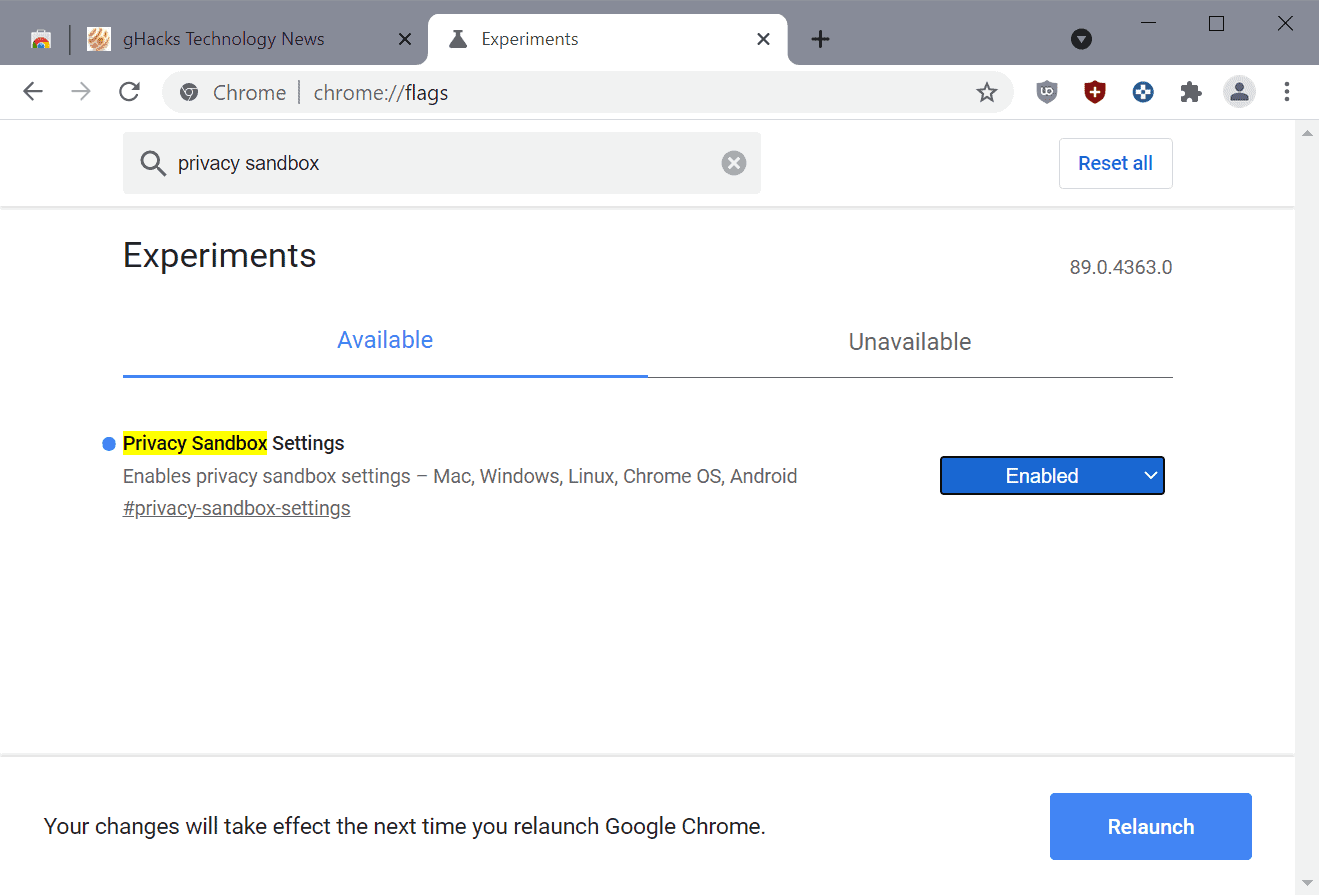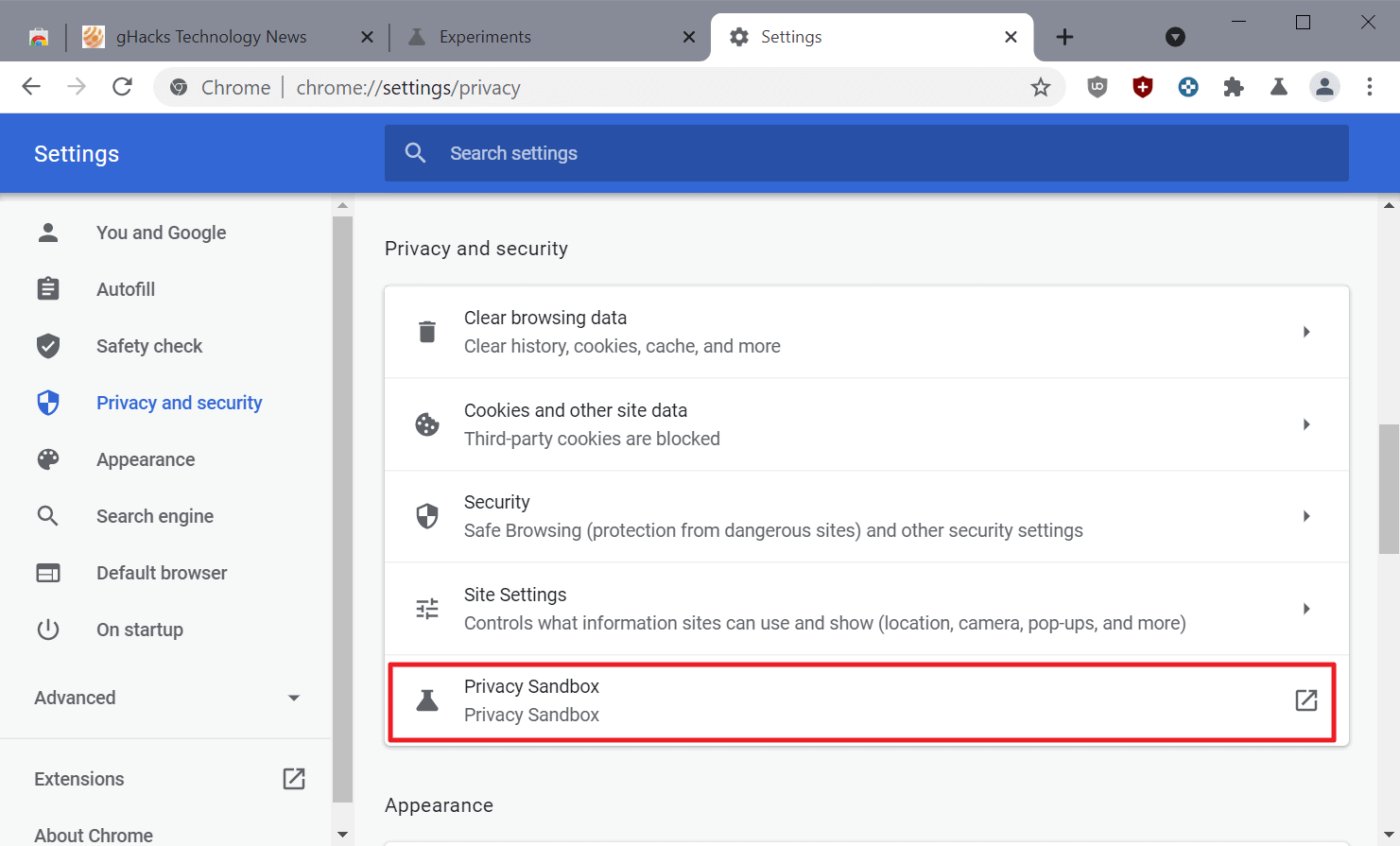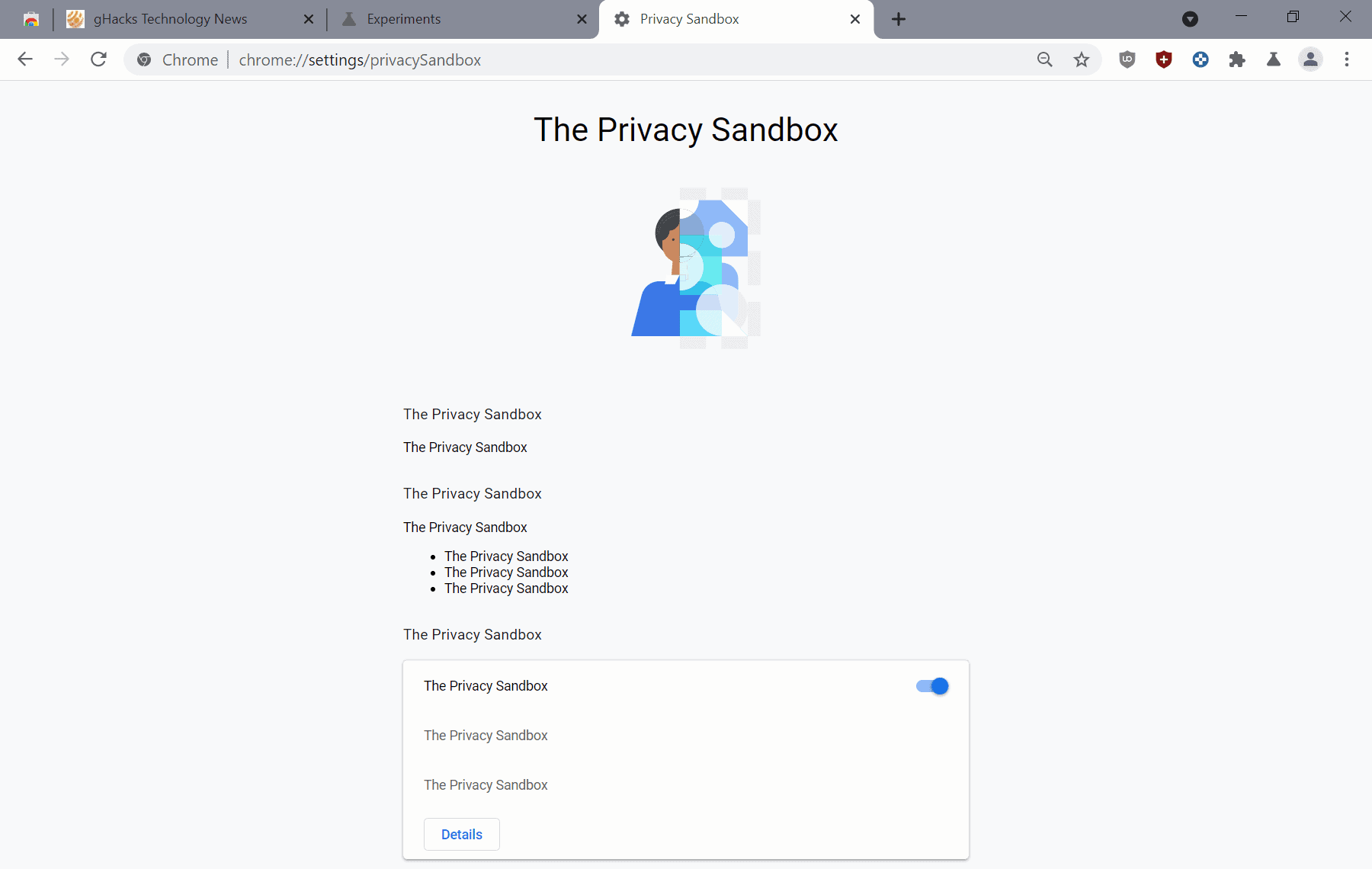First bits of Google's Privacy Sandbox land in Chromium, designed to eliminate third-party cookies

Google announced the Privacy Sandbox initiative back in August 2019 to "fundamentally enhance privacy on the web" by developing a set of open standards. The initiative's goals are to "make the web more private and secure for users" and also to support publishers at the same time.
Privacy Sandbox aims to improve privacy on the Internet by limiting and eventually blocking techniques that are used to track users across the Internet, and by introducing new functionality for publishers and advertisers.
Google plans to remove third-party cookies as part of Privacy Sandbox, to address potential workarounds like fingerprinting, cache inspection, or network level tracking techniques, and to replace cross-site functionality hat publishers may use to continue earning revenue on the Internet.
In plain words: eliminate may tracking techniques on the Internet and replacing part of the technology used (not for tracking) so that publishers may still use it.
Google Chrome Privacy Sandbox
The first bits of the Privacy Sandbox landed in Chromium and Google Chrome Canary. Please note that Privacy Sandbox is not yet functional and that it will take time before that is going to happen.

Users interested in Privacy Sandbox can enable the Settings already in Chrome Canary and Chromium.
Here is how that is done:
- Load chrome://flags in the Google Chrome address bar.
- Search for privacy sandbox using the search field at the top.
- Set Privacy Sandbox Settings to Enabled.
- Restart Google Chrome.
The flag adds the Privacy Sandbox option to Chrome's Settings. You find a new link under Settings > Privacy and security.

Chrome opens the internal link chrome://settings/privacySandbox when you activate the Privacy Sandbox option under Settings. The page that opens is a placeholder for now, most options and descriptions are missing.

The details link opens the project's goals page on the Chromium website.
It will take several years for Privacy Sandbox to become fully operational.
Closing Words
Privacy Sandbox will eliminate the use of third-party cookies on the Internet and render some tracking techniques unusable as well; that is a good thing on first glance, but one has to ask if this will lead to Google benefiting from it disproportionally more than other advertisers and publishers.
Chromium's market share gives publishers, advertisers and other browser makers little choice when it comes to accepting the proposed changes, or at least implementing them for the vast majority of users who use a Chromium-based browser.
Now You: what is your take on Privacy Sandbox? (via Techdows)




















there’s no point. There is a utopia ecosystem, you need anonymity, use it.
I for one trust the google to responsibly protect my privacy…
LOL!
@Kansas Man
While Google can’t be trusted, neither can the other two major browser developers (Apple, Mozilla). Are you a Lynx user by any chance?
+1
Privacy’s nice but Google’s an Ad company, so they certainly aren’t going to do anything to hurt Ad revenue, that would be irresponsible. Maybe this will allow them to suck up even more of the Ad universe, IDK.
I do know that disabling third party cookies wrecks lots of sites and makes browsing generally unpredictable with cool things such as unresponsive shopping carts and payment systems so at face value this doesn’t make a lot of sense.
I really love recaptchas, bring ’em on!
about recaptchas, we have seen cloudflare and hcaptcha too.
at least recaptchas can be easily solved with buster extension.
cloudflare/hcaptcha is an unsolved nightware always asking for solving their crap again and again.
I can’t believe I’m saying this, recaptcha is an superior product to other captchas, I hope recaptchas kill other crappy captchas like hcaptcha.
That should be obvious but apparently it’s not: do not trust a “privacy initiative” from Google. Their announcement (first link of the article) makes it clear that they still want advertisers to deliver “relevant ads”, Google’s main business:
“blocking cookies without another way to deliver relevant ads significantly reduces publishers’ primary means of funding, which jeopardizes the future of the vibrant web.”
“So we are doing something different. We want to find a solution that both really protects user privacy [yeah, right…] and also helps content remain freely accessible on the web.”
The Ghacks article doesn’t give any detail on the alternative tracking techniques Google is preparing to enforce, in spite of some interesting available material. A sample:
https://blog.chromium.org/2019/08/potential-uses-for-privacy-sandbox.html
” Ad Selection
One of the most challenging questions is what your browser could do to allow a publisher to pick relevant content or show a relevant ad to you”
” Conversion Measurement
Publishers and advertisers need to know if advertising actually leads to more business. If it’s driving sales, it’s clearly relevant to users, and if it’s not, they need to improve the content and personalization to make it more relevant. Users then benefit from ads centered around their interests, and advertisers benefit from more effective advertising.”
And with those motivations they call that a privacy initiative… They only want to spy on us differently, and not even in a more privacy respecting way when everything is taken into account.
Lots of this shit is sold by Google as privacy enhancing basically because it’s in some sense not as bad as the worst possible option of having all the data fully exposed. But being spied on without consent by your own browser “but with differential privacy !” instead of it shutting up, or your own browser helping advertisers targeting ads from what it knows about you, is still a privacy nightmare and certainly not the best practically possible option. Only the best Google will allow us to have, this is what happens when the advertisers control the web standards and browsers. In some sense it’s worse than the current situation as with some of their proposals our own software will betray us more directly than before, so they need more propaganda work to convince us that it’s better. But Apple with their “ad attribution system” in the Safari engine, Mozilla with their targeted ad tiles experiments and Pocket targeted ad system, and less relevant browsers like Brave with their own targeted ad system too, scouted this area before for Google, now it’s time for daddy to do it too.
Oh, also some welcome bashing from the EFF, “Don’t play in Google’s Privacy Sandbox”, finally the opinion of an organization that doesn’t make money from spying on us:
https://www.eff.org/deeplinks/2019/08/dont-play-googles-privacy-sandbox-1
Making “privacy enhancing” features solely for Google, for example their ad networks, would be too obvious, IMO. It would make more sense, and there is a history in other industries, that large companies band together to try and make it harder for new competitors. I suspect this is why companies like Facebook are welcoming “regulation,” whatever that means anymore.
Appreciate it when Google does something nice.
Agree with plb4333. Today, it is not necessary to use a third-party cookie to track a user.
I think most of users here does not know the power of the “Server-Side Tagging” of Google Tag Manager. Third-party trackers are no longer run from your browser but from a “Proxy” server called “Server container”. Google recommends that webmasters install the javascript library (for Google API calls) on a sub-domain of their own website.
By this way,
1) Google bypasses ad/tracker’s blockers and device fingerprint’s blockers
2) Google destroys its advertising competitors using third-party cookies
3) Google send a “good” message to protect the user privacy ^^
Don’t be too naive…Google doesn’t do a ‘get nice’ for no reason. We all can bet that google has already figured out how to take advantage of this.
Martin, you are stating “but one has to ask if this will lead to Google benefiting from it disproportionately”. Really do you have to ask yourself this?
I understand that you cant only hint because of that you need Google for your work, so that’s not a problem for me.
I am on the outer hand are not bothered with this restriction so i can wright that I quit convinced that the only reason is that this function is not yet implemented is to give advertisers time to end there exciting contracts or give them time so there exciting contracts can run out. This so new contracts can be made up exclusively with Google and there subcontractors.
> what is your take on Privacy Sandbox?
Good and consequent development. Chromium adopting this means that websites will have to adapt to it.